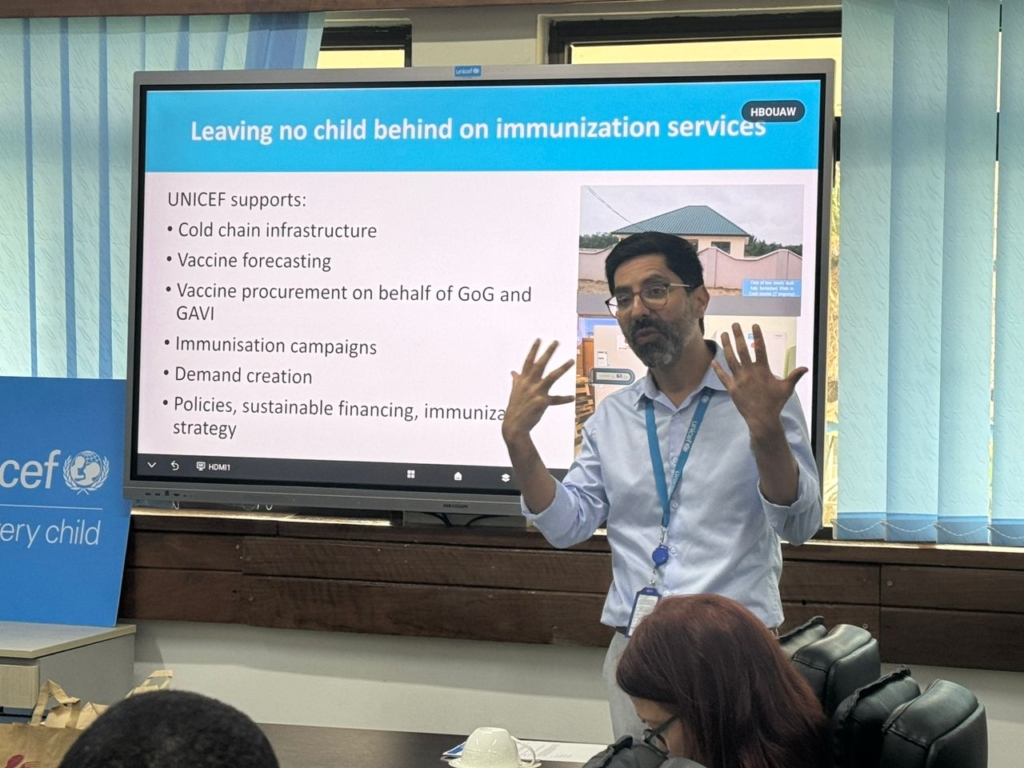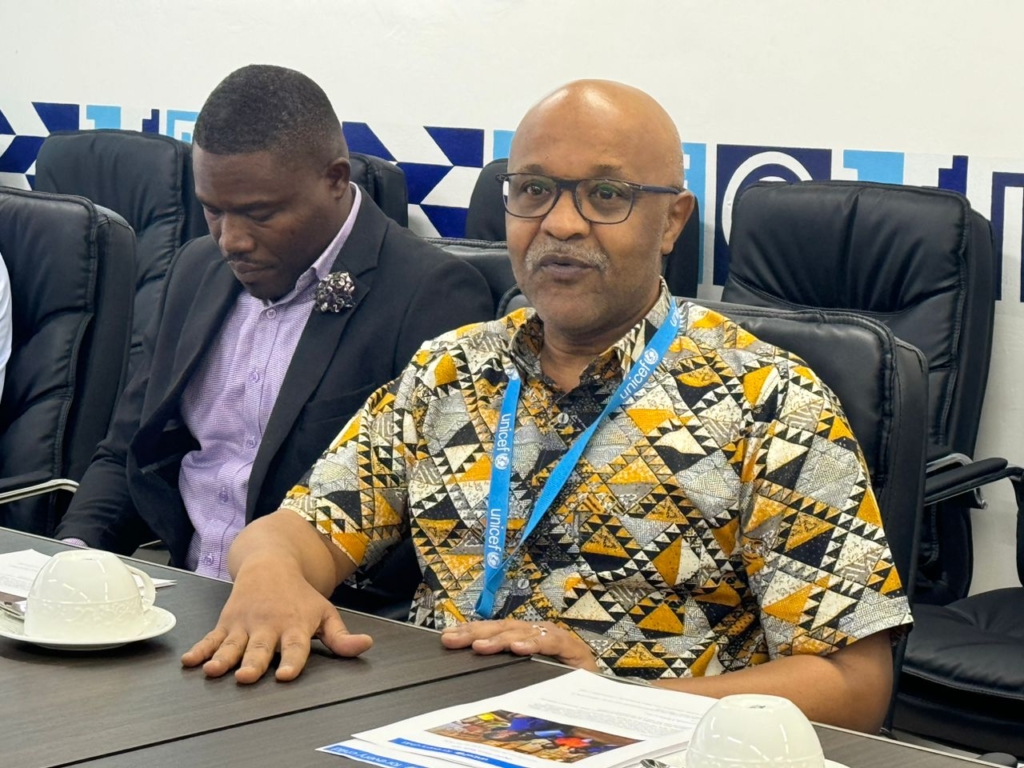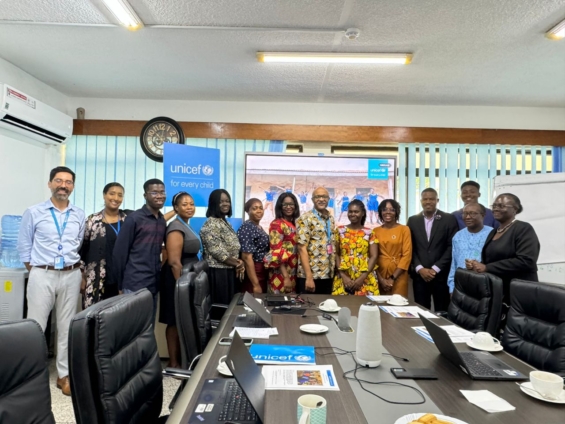UNICEF Ghana says "gaps in care practices and access to quality and inclusive health and nutrition services are impeding the development of children" in Ghana.
The identified gaps in care practices range from neonatal care, vaccination coverage, quality of care for newborns exposed to HIV-positive mothers, environmental health, nutrition, and access to preventive health services as well as general quality of care in health facilities.
Children and adolescent are the most vulnerable to these gaps.
At a Media Café, held to re-engage the media on the core functions of the world’s children-centered humanitarian organization, UNICEF’s Chief of Communication and Advocacy, Fatma Naib, emphasised the importance of preventive intervention supports.
She stressed that while the data on children’s health and nutrition is concerning, there is potential for improvement if everyone understands and acts on their roles and responsibilities.
Ms Naib stated, “the situation can turn around if all and sundry knew their roles and responsibilities to take the necessary actions even before the challenge sets in and subsequently be demanding a national attention for redress.”
A key strategy, according to her, is for "the media to fill in the communication gap to help educate and create awareness among the populace on the responsibilities of all sectors including citizens."
She believes this could lead to faster and more effective behaviour and attitudinal changes compared to relying solely on the government and organisations like UNICEF to shoulder all responsibilities, including preventive actions.
The Media Café focused on the health and nutrition data trends in Ghana, particularly among children. Chief of Health and Nutrition at UNICEF Ghana, Dr. Emmanuel Juan Dewez, presented the latest data.

He highlighted both successes and challenges in areas such as child mortality, quality of care, environmental health, nutrition, HIV infections among newborns, and teenage pregnancy.
On the subject of child mortality and quality of care, Dr. Dewez observed, “over the last three decades, infant mortality reduced from 77 to 40 deaths per 1,000 live births as of 2022. 73% of children aged between 12-23 months have been fully vaccinated against all basic antigens within the same period.
However, neonatal mortality rates and high rates of stillbirths as well as adolescent pregnancy remain major challenges.” He added, “these trends highlight gaps in care, particularly for under-served populations.”
Regarding mother-to-child HIV transmissions, Dr. Dewez revealed, “only 47% of infants exposed to HIV+ mothers had early infant diagnosis tests performed in 2021.
The time of reporting the results has also reduced from 90-180 days to 1-5 days.” He described this as significant progress compared to previous years.
In support of neonatal care, the UNICEF Chief of Health and Nutrition said, the organisation has "supported the establishment of level 2 New Born Care Units in 7 districts and will complete the construction of two regional level Newborn Care Units to serve as referral centers this year, 2024."

Malnutrition, stunting among children, and anemia among adolescents and women of childbearing age remain persistent nutritional challenges.
The latest data show that 17% of children under 5 are affected by stunting, 12% are underweight, 6% are wasted, and 49% are anemic.
Additionally, 40% of women aged between 15-49 years and 43.8% of adolescents aged between 10-19 years are anemic.
Despite these concerning data trends, UNICEF Ghana Country Representative Osama Makkawi remains optimistic.
He praised Ghana for her achievements in development, democracy, peace, and security. Makkawi stated, "Ghana, on the whole and among its peers in the region, has done great. My motivation to work in Ghana is largely driven by the tremendous successes she has achieved."
He is confident that with the support of the media and all stakeholders, issues relating to children’s welfare will receive the right attention and timely response.
Latest Stories
-
Center for Learning and Childhood Development Director Dr Kwame Sakyi honoured at Ghana Philanthropy Awards
3 hours -
Asantehene receives 28 looted artefacts
4 hours -
CAF WCL 2024: Ghana’s Thelma Baffour wins title with TP Mazembe
5 hours -
Benjamin Boakye slams politicisation of energy sector issues and ECG’s inefficiencies
5 hours -
Erastus Asare Donkor and Dr Neta Parsram win big at 10th Mining Industry Awards
5 hours -
Government is “suppressing information” about power sector challenges – IES Director
5 hours -
Majority of our debts caused by forex shortfall – ECG Boss
6 hours -
Pan-African Savings and Loans supports Ghana Blind Union with boreholes
6 hours -
Bole-Bamboi MP Yussif Sulemana donates to artisans and Bole SHS
7 hours -
Top up your credit to avoid potential disruption – ECG to Nuri meter customers
7 hours -
Dutch & Co wins 2024 Entrepreneur of the Year Award
7 hours -
We’ll cut down imports and boost consumption of local rice and other products – Mahama
9 hours -
Prof Opoku-Agyemang donates to Tamale orphanage to mark her birthday
10 hours -
Don’t call re-painted old schools brand new infrastructure – Prof Opoku-Agyemang tells gov’t
11 hours -
Sunon Asogli plant will be back on stream in a few weeks – ECG
11 hours

